Franklin Templeton’s Voice of the American Worker study, now in its third year, uncovered some interesting new trends and also a reversal in others that had taken root during the COVID-19 lockdown period. One thing that’s clear is workers today are feeling more financial stress and concern, which also has implications for employers.
Our annual survey, conducted by The Harris Poll on behalf of Franklin Templeton, is connected to Franklin Templeton’s Retirement Innovation Initiative (RII), which launched in January 2020. RII’s mission is to bring together industry experts who share the same vision—improving the future of retirement in the United States. The survey respondents represent a snapshot of the US workforce: across the country, across industry, and across generations and backgrounds.
Throughout the last three years, we’ve seen some evergreen trends reconfirmed year over year:
- Workers continue to seek improved well-being and need support in addressing existing roadblocks.
- A focus on well-being continues to include urgency in improving financial health with key opportunities for employer support.
- Workers remain more focused on financial independence than traditional retirement.
- There has never been a more urgent time for employers to evaluate their benefit offerings and consider ways to evolve how employee needs are supported.
Below are some highlights of specific findings in our 2023 survey, analysis and possible action items for employers.
Financial stress and concerns are accelerating in the current economic climate
Financial independence, plans for retirement, and feelings of job stability are all in jeopardy as American workers grapple with economic uncertainty. Our Voice of the American Worker survey found Millennials and women feel especially insecure.
Survey findings: Two-thirds of American workers (66%) surveyed said they are experiencing negative effects from the current economic environment. Nearly a third (30%) say it’s affecting their sleep, a quarter (25%) report strained relationships and nearly a quarter (22%) feel distracted at work. And as American workers grapple with economic uncertainty, 42% of workers said they are highly stressed by their financial health, up from 35% last year.
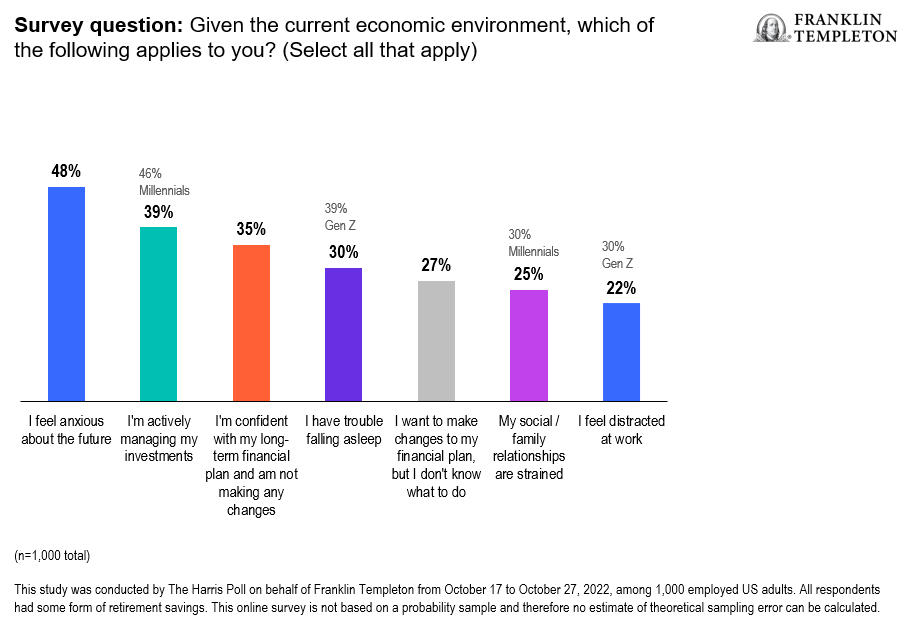
Action item for employers: With the stress of a potential recession on the horizon, it’s critical for employers to check in with their employees to see how they’re feeling and offer comprehensive, personalized support. When it comes to employee benefits, more American workers want access to a financial professional than last year (+7%), as part of their employee benefits. Over half (58%) show interest in speaking with a financial professional.
The current economic climate is delaying and altering retirement plans
It’s no surprise that given financial stress has increased, more workers are planning to delay retirement. The good news is that workers are more likely to contribute to their retirement, delay it or reexamine providers, and less likely to stop saving altogether or borrow against their retirement plan.
Survey findings: Individuals now plan to retire at 65, a jump of three years due to the current economic situation. Six in 10 American workers (61%) feel their retirement plans are in jeopardy. Further, 73% of employees report that soaring living expenses have changed the way they envisioned their retirement. Most Americans (58%) plan to work in some fashion during their retirement, an increase of 6% from two years ago.
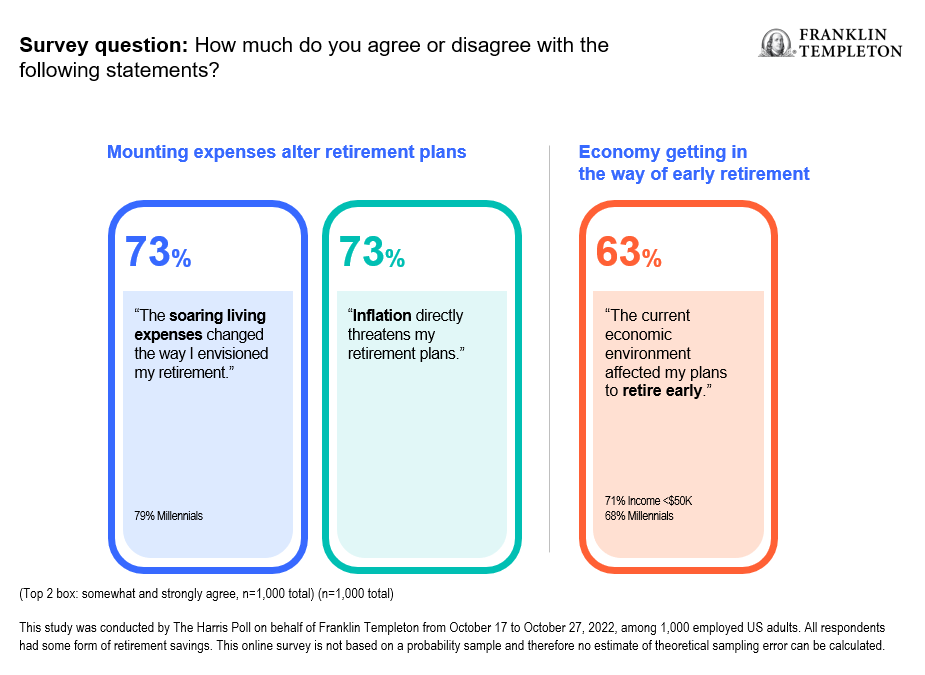
Action item for employers: We see some behaviors of concern revealed, such as borrowing against one’s retirement plan or moving money out of plan to cash. We think this is an ideal time for employers to evaluate their total benefit offering with some tools just recently made more readily available via SECURE 2.0—like emergency savings, loan provisions and student loan debt repayment. Employees are looking for additional income during the current economic environment and are less likely to cut back on their retirement savings, which is good news. However, their higher expenses are causing stress and could impact their work. If employers are unable to increase employees pay, they should consider offering incentives for good financial behaviors.
The Great Resignation turns into The Great Return
The “Great Resignation” was a buzzword during the COVID-19 lockdown years, but amid today’s uncertainties, employees seem to be looking more for stability.
Survey finding: According to our Voice of the American Worker study, 66% of employees said they want to stay put with their current employers, and 89% of workers said that they are likely to stay at their current job in the next 12 months. We are also seeing evidence of a “Great Return,” as 37% of individuals who had left jobs said they were considering going back to their prior employer, and 47% said one of their colleagues came back to a job they had left in the past five years.
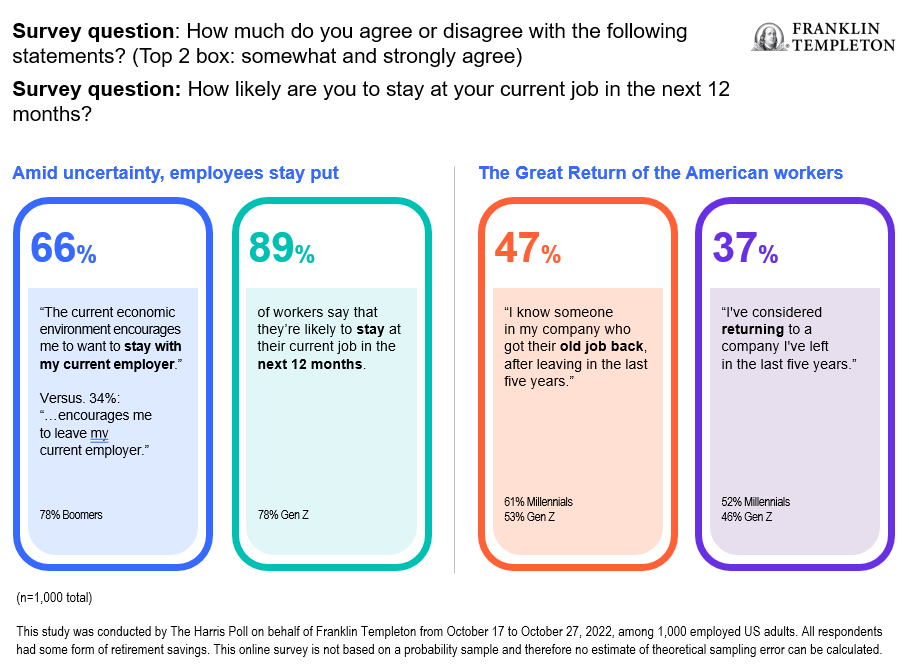
Action item for employers: We think there is a huge opportunity for employers to take a more holistic approach to benefits and support. The impact on sentiment is notable, as employees said it has an impact on how they feel working where they work, how much effort they put in while at work, and how long they’ll stay at their job. It’s important to point out that these feelings are emphasized for younger generations.
Well-being and the need for a holistic approach
Our survey revealed that American workers are turning to employers for more personalized support in improving well-being across all dimensions.
Survey findings: Assessing all financial goals together continues to be a top priority for employees, with 70% keenly interested in more holistic benefits, meaning, benefits that access all goals together. This includes not only resources and tools that address retirement, but also those that support employees in all areas of their financial lives. Seven in 10 American workers (71%) said that it matters to them that their employer addresses the current economic climate.
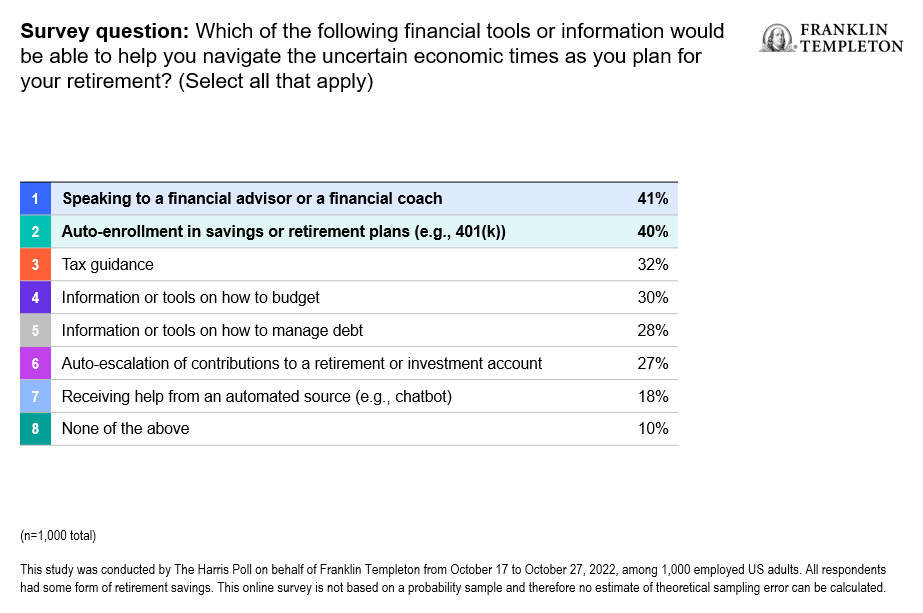
Action items for employers: It’s no surprise that 52% of employees want “an increase in pay” which would help alleviate inflation-related stress. What’s also interesting are some of the other things they are looking to their employers to provide, such as guaranteed retirement income, a contribution to an emergency savings fund or a health savings account, funding options for their children’s education, and contributions toward debt payments. We see this as a great punch list of items for those employers looking to closely consider updates to their benefits offerings.
Financial independence remains a top priority
We define financial independence as “having enough income or wealth sufficient to pay one’s living expenses without having to be employed or dependent on others” and as you can imagine, the path to achieving financial independence will not look the same for everyone.
Survey finding: All in all, regardless of the current economic or workforce environment, employees continue to view financial independence as their primary north star. This year, 74% stated financial independence is their top financial concern, up from 69% in last year’s study. In addition, 81% of respondents said they are more focused on becoming financially independent. Among other concerns, the next most important was paying off debt (61%), which was up 7% since last year. That is not surprising given that US credit card debt levels just hit a 20-year high.
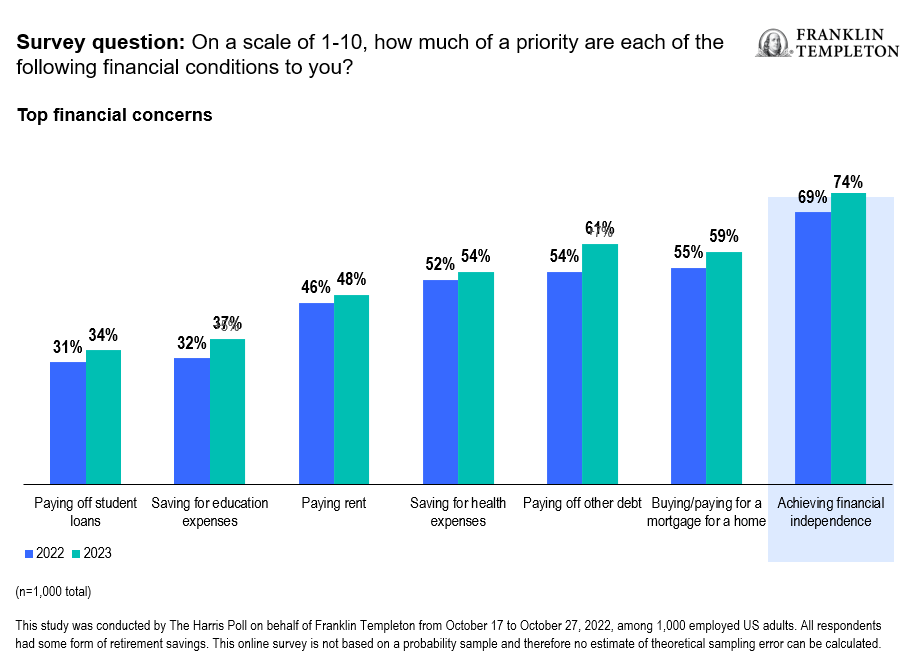
Action item for employers: We as an industry and employers have a key opportunity to engage employees across the full spectrum of financial aspects and provide holistic support in helping employees reach financial independence. Three-quarters (77%) of our survey respondents said they’d be more likely to participate or contribute more to their retirement savings if there were more personalized 401(k) investment options, and they are seeking access to advice. They want access to a financial advisor, they want auto-enrollment, tax guidance, budgeting and debt guidance.
For additional information, please contact the Franklin Templeton Retirement Sales Department at (800) 530-2432 or visit https://www.franklintempleton.com/insights/research-findings/voice-of-the-american-worker-survey.
The Voice of the American Worker study was conducted by The Harris Poll on behalf of Franklin Templeton from October 17 to October 27, 2022, among 1,000 employed U.S. adults. All respondents had some form of retirement savings. This online survey is not based on a probability sample and therefore no estimate of theoretical sampling error can be calculated. Findings from 2020 reference a study of a similar nature that was conducted by The Harris Poll on behalf of Franklin Templeton from October 16 to 28, 2020, among 1,007 employed U.S. adults, and findings from 2021 reference a similar survey conducted among 1,005 employed adults from October 28 to November 15, 2021.Franklin Templeton is not affiliated with The Harris Poll, Harris Insights & Analytics, a Stagwell LLC Company.
IMPORANT LEGAL INFORMATION
This material is intended to be of general interest only and should not be construed as individual investment advice or a recommendation or solicitation to buy, sell or hold any security or to adopt any investment strategy. It does not constitute legal or tax advice. This material may not be reproduced, distributed or published without prior written permission from Franklin Templeton.
The views expressed are those of the author and the comments, opinions and analyses are rendered as at publication date and may change without notice. The underlying assumptions and these views are subject to change based on market and other conditions and may differ from other portfolio managers or of the firm as a whole. The information provided in this material is not intended as a complete analysis of every material fact regarding any country, region or market. There is no assurance that any prediction, projection or forecast on the economy, stock market, bond market or the economic trends of the markets will be realized. The value of investments and the income from them can go down as well as up and you may not get back the full amount that you invested. Past performance is not necessarily indicative nor a guarantee of future performance. All investments involve risks, including possible loss of principal.
Any research and analysis contained in this presentation has been procured by Franklin Templeton for its own purposes and may be acted upon in that connection and, as such, is provided to you incidentally. Data from third party sources may have been used in the preparation of this material and Franklin Templeton (“FT”) has not independently verified, validated or audited such data. Although information has been obtained from sources that Franklin Templeton believes to be reliable, no guarantee can be given as to its accuracy and such information may be incomplete or condensed and may be subject to change at any time without notice. The mention of any individual securities should neither constitute nor be construed as a recommendation to purchase, hold or sell any securities, and the information provided regarding such individual securities (if any) is not a sufficient basis upon which to make an investment decision. FT accepts no liability whatsoever for any loss arising from use of this information and reliance upon the comments, opinions and analyses in the material is at the sole discretion of the user.
Products, services and information may not be available in all jurisdictions and are offered outside the U.S. by other FT affiliates and/or their distributors as local laws and regulation permits. Please consult your own financial professional or Franklin Templeton institutional contact for further information on availability of products and services in your jurisdiction.
Issued in the U.S. by Franklin Distributors, LLC., One Franklin Parkway, San Mateo, California 94403-1906, (800) DIAL BEN/342-5236, franklintempleton.com – Franklin Distributors, LLC, member FINRA/SIPC, is the principal distributor of Franklin Templeton U.S. registered products, which are not FDIC insured; may lose value; and are not bank guaranteed and are available only in jurisdictions where an offer or solicitation of such products is permitted under applicable laws and regulation.
Please visit www.franklinresources.com to be directed to your local Franklin Templeton website.
Franklin Distributors, LLC. Member FINRA/SIPC. Prior to July 7, 2021, Franklin Templeton Distributors, Inc., and Legg Mason Investor Services, LLC served as mutual fund distributors for Franklin Templeton.

